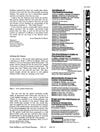 July 2017 in “British Journal of Dermatology”
July 2017 in “British Journal of Dermatology” The document concludes that scalp conditions have various causes and can present in many different ways.

The conclusion is that endocrinology significantly impacts medicine with various common medications used for treatment.
 July 2016 in “Journal of Investigative Dermatology”
July 2016 in “Journal of Investigative Dermatology” R-spondin2 may help treat hair loss, gene differences could explain baldness, a peptide's regulation is linked to psoriasis, B-defensin gene copies may affect a skin condition's risk and severity, and potential markers and targets for alopecia areata were identified.
 January 2011 in “Der Pharmacia Lettre”
January 2011 in “Der Pharmacia Lettre” Pig oil was found to significantly promote hair growth in rats, more effectively than Minoxidil.
 October 2010 in “International journal of radiation oncology, biology, physics”
October 2010 in “International journal of radiation oncology, biology, physics” Two cycles of ABVD chemotherapy followed by 20 Gy radiotherapy is the new standard for early-stage Hodgkin lymphoma due to lower toxicity and similar effectiveness.
 January 2008 in “Annals of Nutrition and Metabolism”
January 2008 in “Annals of Nutrition and Metabolism” Parthenolide promotes hair growth in mice and may influence pathways related to male pattern baldness.
 August 1978 in “Dicp-The annals of pharmacotherapy”
August 1978 in “Dicp-The annals of pharmacotherapy” Crash diets can cause temporary hair loss, and professional medical advice can prevent serious health issues.
 555 citations,
April 2002 in “The Lancet”
555 citations,
April 2002 in “The Lancet” Off-pump heart surgery reduces complications without affecting survival rates compared to on-pump surgery.
 499 citations,
September 2011 in “Cell”
499 citations,
September 2011 in “Cell” Fat-related cells are important for initiating hair growth.
 479 citations,
January 2005 in “BioEssays”
479 citations,
January 2005 in “BioEssays” Hair follicle development is controlled by interactions between skin tissues and specific molecular signals.
 384 citations,
June 2005 in “Genes & development”
384 citations,
June 2005 in “Genes & development” β-catenin is essential for stem cell activation and proliferation in hair follicles.
 375 citations,
February 2006 in “Journal of Cell Science”
375 citations,
February 2006 in “Journal of Cell Science” The document concludes that the hair cycle is a complex process involving growth, regression, and rest phases, regulated by various molecular signals.
 330 citations,
December 2009 in “Cell stem cell”
330 citations,
December 2009 in “Cell stem cell” SKPs are similar to adult skin stem cells and could help in skin repair and hair growth.
 234 citations,
April 2000 in “Gene”
234 citations,
April 2000 in “Gene” Msx and Dlx genes are crucial for development, controlling cell behaviors like growth and differentiation through their roles as gene regulators.
 211 citations,
May 2018 in “Trends in cell biology”
211 citations,
May 2018 in “Trends in cell biology” Different types of skin cells play specific roles in development, healing, and cancer.
 205 citations,
March 2012 in “Science Translational Medicine”
205 citations,
March 2012 in “Science Translational Medicine” PGD2 stops hair growth and is higher in bald men with AGA.
 191 citations,
September 2011 in “Cell stem cell”
191 citations,
September 2011 in “Cell stem cell” Hair follicle stem cells use specific chromatin changes to control their growth and differentiation.
 170 citations,
July 2012 in “Journal of Investigative Dermatology”
170 citations,
July 2012 in “Journal of Investigative Dermatology” Wnt ligands are crucial for hair growth and repair.
 148 citations,
December 2018 in “Journal of autoimmunity”
148 citations,
December 2018 in “Journal of autoimmunity” Alopecia areata is an autoimmune disease causing patchy hair loss, often with other autoimmune disorders, but its exact causes are unknown.
 145 citations,
November 2018 in “Nature Communications”
145 citations,
November 2018 in “Nature Communications” The Sonic hedgehog pathway is crucial for new hair growth during mouse skin healing.
 137 citations,
September 2005 in “Proceedings of the National Academy of Sciences of the United States of America”
137 citations,
September 2005 in “Proceedings of the National Academy of Sciences of the United States of America” The HR protein helps hair grow by blocking a hair growth inhibitor, aiding in hair follicle regeneration.
 116 citations,
August 2010 in “Nature”
116 citations,
August 2010 in “Nature” Scientists turned rat thymus cells into stem cells that can help repair skin and hair.
 115 citations,
September 2012 in “Experimental Dermatology”
115 citations,
September 2012 in “Experimental Dermatology” Androgens have complex effects on hair growth, promoting it in some areas but causing hair loss in others, and our understanding of this is still evolving.
 106 citations,
March 2014 in “BioEssays”
106 citations,
March 2014 in “BioEssays” We need more research to better understand human hair follicle stem cells for improved treatments for hair loss and skin cancer.
 103 citations,
January 2006 in “Journal of Cell Science”
103 citations,
January 2006 in “Journal of Cell Science” The document concludes that the hair cycle is a complex process involving growth, regression, and rest phases, regulated by various molecular signals.
 99 citations,
July 2017 in “Clinical Reviews in Allergy & Immunology”
99 citations,
July 2017 in “Clinical Reviews in Allergy & Immunology” New treatments for Alopecia Areata show promise but need to be more effective and affordable.
 96 citations,
October 2000 in “The FASEB Journal”
96 citations,
October 2000 in “The FASEB Journal” The p75 neurotrophin receptor is important for hair follicle regression by controlling cell death.
 95 citations,
May 2012 in “British Journal of Dermatology”
95 citations,
May 2012 in “British Journal of Dermatology” Androgens block hair growth by disrupting cell signals; targeting GSK-3 may help treat hair loss.
 92 citations,
June 2005 in “Journal of Investigative Dermatology”
92 citations,
June 2005 in “Journal of Investigative Dermatology” All-trans retinoic acid causes hair loss by increasing TGF-β2 in hair follicle cells.
 91 citations,
May 2003 in “American Journal of Pathology”
91 citations,
May 2003 in “American Journal of Pathology” Prolactin affects hair growth cycles and can cause early hair follicle regression.






























